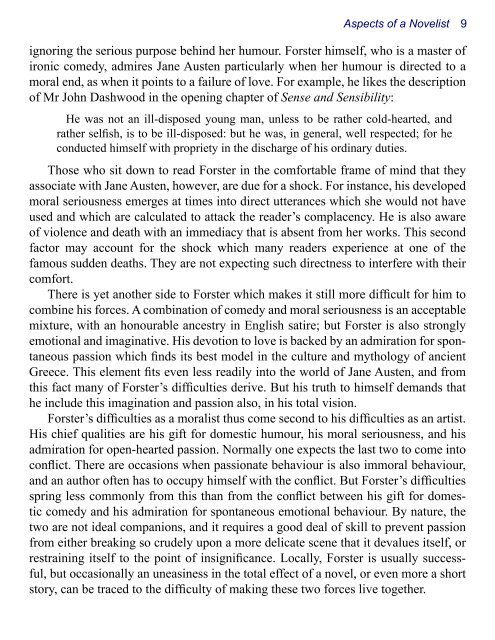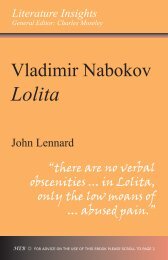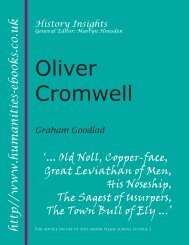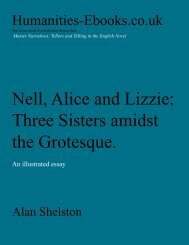The Achievement of E. M. Forster - Humanities-Ebooks
The Achievement of E. M. Forster - Humanities-Ebooks
The Achievement of E. M. Forster - Humanities-Ebooks
You also want an ePaper? Increase the reach of your titles
YUMPU automatically turns print PDFs into web optimized ePapers that Google loves.
Aspects <strong>of</strong> a Novelist <br />
ignoring the serious purpose behind her humour. <strong>Forster</strong> himself, who is a master <strong>of</strong><br />
ironic comedy, admires Jane Austen particularly when her humour is directed to a<br />
moral end, as when it points to a failure <strong>of</strong> love. For example, he likes the description<br />
<strong>of</strong> Mr John Dashwood in the opening chapter <strong>of</strong> Sense and Sensibility:<br />
He was not an ill-disposed young man, unless to be rather cold-hearted, and<br />
rather selfish, is to be ill-disposed: but he was, in general, well respected; for he<br />
conducted himself with propriety in the discharge <strong>of</strong> his ordinary duties.<br />
Those who sit down to read <strong>Forster</strong> in the comfortable frame <strong>of</strong> mind that they<br />
associate with Jane Austen, however, are due for a shock. For instance, his developed<br />
moral seriousness emerges at times into direct utterances which she would not have<br />
used and which are calculated to attack the reader’s complacency. He is also aware<br />
<strong>of</strong> violence and death with an immediacy that is absent from her works. This second<br />
factor may account for the shock which many readers experience at one <strong>of</strong> the<br />
famous sudden deaths. <strong>The</strong>y are not expecting such directness to interfere with their<br />
comfort.<br />
<strong>The</strong>re is yet another side to <strong>Forster</strong> which makes it still more difficult for him to<br />
combine his forces. A combination <strong>of</strong> comedy and moral seriousness is an acceptable<br />
mixture, with an honourable ancestry in English satire; but <strong>Forster</strong> is also strongly<br />
emotional and imaginative. His devotion to love is backed by an admiration for spontaneous<br />
passion which finds its best model in the culture and mythology <strong>of</strong> ancient<br />
Greece. This element fits even less readily into the world <strong>of</strong> Jane Austen, and from<br />
this fact many <strong>of</strong> <strong>Forster</strong>’s difficulties derive. But his truth to himself demands that<br />
he include this imagination and passion also, in his total vision.<br />
<strong>Forster</strong>’s difficulties as a moralist thus come second to his difficulties as an artist.<br />
His chief qualities are his gift for domestic humour, his moral seriousness, and his<br />
admiration for open-hearted passion. Normally one expects the last two to come into<br />
conflict. <strong>The</strong>re are occasions when passionate behaviour is also immoral behaviour,<br />
and an author <strong>of</strong>ten has to occupy himself with the conflict. But <strong>Forster</strong>’s difficulties<br />
spring less commonly from this than from the conflict between his gift for domestic<br />
comedy and his admiration for spontaneous emotional behaviour. By nature, the<br />
two are not ideal companions, and it requires a good deal <strong>of</strong> skill to prevent passion<br />
from either breaking so crudely upon a more delicate scene that it devalues itself, or<br />
restraining itself to the point <strong>of</strong> insignificance. Locally, <strong>Forster</strong> is usually successful,<br />
but occasionally an uneasiness in the total effect <strong>of</strong> a novel, or even more a short<br />
story, can be traced to the difficulty <strong>of</strong> making these two forces live together.

















